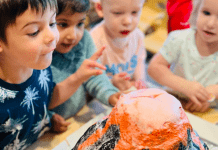
I’m writing this month’s blog post from a beautiful beach house in southern California. All is calm and quiet… because it’s 5 in the morning California time. The last 24 hours tried every ounce of my empathy. I am so grateful now that I chose to focus on empathy for the month of July. If I hadn’t, I don’t think I would have survived.
My family and I flew to California yesterday afternoon. The flight went perfectly until the landing, when my poor son projectile vomited all over me MULTIPLE times while I was frantically searching for the vomit bag in the seat pocket in front of me (Hint: it’s behind the tray). After I cleaned him up as best as I could, and we were waiting to deplane, I handed him to my husband where he had an accident, covering both he and my husband in pee. That was just the beginning of his illness, and I’ve now been thrown up on more than I want to admit. I don’t handle bodily fluids well; that is usually my husband’s responsibility. After each round of puking/peeing, I reminded myself of the empathy questions I was working on this month. My focus on empathy helped me to bring the situation back into perspective.
Why empathy
Empathy is the ability to vicariously feel or identify with another person’s thoughts, feelings or emotions. At the beginning of July, I was pouring over my favorite parenting books: the dog-eared ones I reread over and over again when I struggle to find an answer to a parenting solution. My oldest daughter, Lily, is almost five and she hadn’t ever had a huge tantrum until the beginning of July. When she did, I found her tantrum vexing. I felt helpless as she sobbed, flailing in my husband’s arms that day. The experience drove me to understand her behavior, so I set off on a journey to find answers. As I was rereading my favorite chapters, empathy kept popping up in each book I looked in.
Empathy questions
In the book Raising Resilient Children: Fostering Strength, Hope and Optimism in your Child, I found the empathy questions that would shape the rest of my month.
1. Am I saying or doing things in a way that would make my children the most receptive to listening to what I have to say and learning from me?
2. Would I want anyone to speak with me in the way I am speaking with my children?
3. What do my children think about the choices I make for them?
It hurt when I realized I wasn’t being as empathetic as I thought. Growing up, I was often told what I felt and how to fix it. I don’t want that for my children, so empathy became my theme.
I started each interaction with my kids by asking myself these questions. Not every question applied to each situation, but there was always at least one question that applied. When my daughter’s next tantrum started I took a deep breath and asked myself, “Am I responding in a way that will help Lily listen to what I am saying?”
I wasn’t perfect at it, but I did start to see an improvement in her behavior as the month went on.
Teaching empathy
When I could work through the process myself, I started pointing out other people’s emotions to Lily. She has been able to identify her own emotions since she was about 2 ½ (it was something that we worked on regularly), but I noticed that she couldn’t always see what others were feeling. It started out with me sitting next to her while she watched a Daniel Tiger episode. I quizzed her on what she thought the different characters were feeling throughout the episode. Next, I asked her if she had ever had those feelings. I gave her the chance to explain when she had felt the same way.
We named the feelings and empathized, then we chatted about how she knew what they were feeling. Next, I asked what she thought we should do to help them. My goal was to help her translate this process into real life empathy, so we practiced over the next couple weeks. As she was practicing, I would walk her through the same sequence when she and her younger brother had a disagreement. It didn’t work as well at first, because she was emotionally involved in the situation. I totally get it; it’s hard for me to be empathetic toward others when I am upset, too.
Empathy results
For the past week and a half, I have continued to help her use the new skills we developed while watching her Daniel Tiger episodes, and I can see that both she and I are becoming more empathetic toward others. I am a firm believer that we as parents need to practice what we preach, and that being empathetic toward my children will in turn help them develop the skills that will help them act with empathy toward others.

















